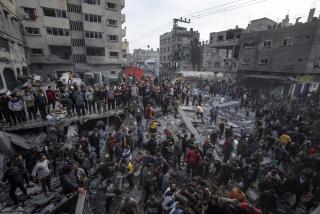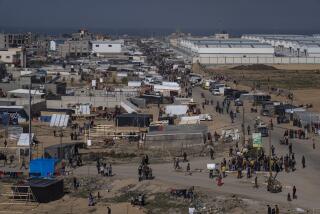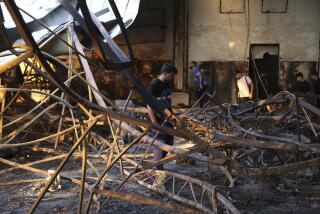Iraq Disputes War Dead Count
BAGHDAD â The Iraqi government on Wednesday condemned as âexaggeratedâ a controversial public health study concluding that more than 600,000 Iraqis have died violently since the toppling of Saddam Husseinâs regime in 2003.
The statement came as shootings, bombings and rockets left at least 25 Iraqis dead and 46 injured around the country. The bodies of 40 people slain execution-style also were found in the capital, part of the surge in sectarian and insurgent strife that is killing an average of 100 a day, according to the United Nations.
A U.S. soldier also died early Wednesday from wounds suffered when his vehicle was hit in a roadside bombing.
The violence has undermined trust in the Shiite Muslim-led government, which was elected in December with a mandate to restore security. Though deaths of civilians have mounted, government spokesman Ali Dabbagh condemned as inaccurate the findings of U.S. and Iraqi public health researchers that were published this week in the medical journal Lancet.
âWe affirm that these numbers are far from the truth and the Iraqi government is making efforts to protect the Iraqi citizen from forces of terror,â Dabbagh said in a release.
The study found that, with 95% certainty, 426,369 to 793,663 Iraqis had died violently since the U.S.-led invasion in March 2003, with 601,027 statistically the most probable death toll. Those figures are many times higher than other reported estimates, including the figure of 50,000 reached by The Times in June after a weeks-long canvassing of Iraqi hospitals, morgues and government offices for death statistics.
On Wednesday, the Iraqi Health Ministry reported that more than 2,660 civilians had been killed in Baghdad in September, Associated Press reported. The toll was about 400 higher than in August, despite an intensified U.S.-Iraqi sweep aimed at reining in the violence.
The U.S. military on Wednesday reported that a mortar attack by insurgents caused a fire at a U.S. ammunition supply depot and sparked a series of explosions that shook much of the capital Tuesday night.
Arab-language television reported that the Islamic Army in Iraq, a Sunni Arab insurgent group, had claimed responsibility for the attack. The mortar shell ignited a fire that set off ammunition at Forward Operating Base Falcon in southern Baghdad.
âIntelligence indicates that civilians aligned with a militia organization were responsible for last nightâs mortar attack,â military spokesman Army Lt. Col. Jonathan Withington said in a news release.
U.S., British and Iraqi military bases frequently draw mortar and rocket fire, which, though rarely inflicting casualties, frays nerves and diverts resources from peacekeeping and combat operations.
Amid the continuing violence, the dominant Shiites and Kurds overruled Sunnis and nationalist Shiites in parliament and narrowly passed a law Wednesday that allows for creation of self-ruled federal regions in Iraq, beginning in 18 months.
Many Shiites want to form an area in the south similar to the Kurdish region in the north, but Sunnis fear the move will lead to autonomous states in the north and south that control Iraqâs oil wealth, excluding the central Sunni area.
Deposed Iraqi President Saddam Hussein and six codefendants returned to a Baghdad courtroom Wednesday to hear witness testimony. They are accused of orchestrating the killings of tens of thousands of Iraqi Kurds during a late-1980s campaign dubbed Anfal, or âspoils of war.â
After ejecting the defendants from the courtroom Tuesday, chief Judge Mohammed Orabi Khalefa opened Wednesdayâs session cordially, asking them to behave respectfully toward the alleged victims testifying.
Hussein politely protested the judgeâs decisions to cut off the broadcast of the trial at certain junctures and force him to stand when he addressed the court.
âWhen the defendants speak, you switch off the broadcast,â he told the judge. âIs that fair?â
The judge held firm.
âThe microphone is for any legal argument, but getting into political issues, this is not allowed,â he said.
One witness told the courtroom that his village was destroyed and three of his siblings disappeared during the Anfal campaign. Abdul Khader Aziz, 50, also produced a document he said showed that 18 women, including 14 of his cousins, were sold to Egyptian nightclubs by Husseinâs intelligence services.
But defendants strenuously objected that he had gotten the information from a Kurdish newspaper. Aziz refused to answer when asked about service in the Kurdish peshmerga militia that battled Husseinâs regime and about membership in the Communist Party.
The trial is to resume Tuesday.
*
More to Read
Sign up for Essential California
The most important California stories and recommendations in your inbox every morning.
You may occasionally receive promotional content from the Los Angeles Times.










